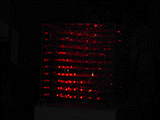 Last night at Dorkbot NY, the informal monthly gathering subtitled "People Doing Strange Things with Electricity," three people gave presentations. Left is my accidental .GIF (I thought I was making an MPEG movie) of James Clar's 3D Display Cube, a device that uses a hideous amount of computing power to render charmingly lowtech 3-D moving sculptures on 1000 LED lights in a 2 foot cube. Think 3D Jim Campbell. Mary Flanagan projected complex abstract patterns generated from the phonemes and word choices of a several month run of
emails between her collaborator Andrew Gerngross and his ex-girlfriend. It was unclear whether the, um, relationship between the data and the display was purely aesthetic, or if there were other connections or conclusions to be drawn. Fang-Yu (Frank) Lin gave a crisp power point talk on "channeling the internet though a robotic typewriter." His artwork was exactly as described: a clunky hybrid of an old manual keyboard and a teletype machine, which acts a kind of spirit medium, bringing you messages from "the internet," a quasi-mystical entity. You type in a question or statement, and hidden hardware and software search for words (in chatboards, blogs, news stories) that might logically or literally follow from what you wrote. Of course, the result--lines of text or ASCII pictures spit out of the teletype--are usually tangential (at best) to your request. Lin uses a hybrid search engine to pull up content, but casts a narrow net, apparently grabbing the first thing remotely connected to your search. The piece was almost aggressively dumb, and retro, and pseudoscientific, a kind of satirical antidote to the globalist, futurist slogans routinely bandied about by tech companies and new media visionaries (cf. Maciej Wisniewski's netomat). I immediately thought of Scott Bukatman's essay "Gibson's Typewriter," which considers the global information sea change through the metaphor of William Gibson banging out Neuromancer on a manual typewriter. Lin's presentation echoed one of Bukatman's themes--that mechanical writing was an earlier and no less earth-shaking "information revolution." The fixation on the typewriter is also in sync with current trends such as whipping out giant old cell phones purchased on Ebay to impress potential dates. Last night at Dorkbot NY, the informal monthly gathering subtitled "People Doing Strange Things with Electricity," three people gave presentations. Left is my accidental .GIF (I thought I was making an MPEG movie) of James Clar's 3D Display Cube, a device that uses a hideous amount of computing power to render charmingly lowtech 3-D moving sculptures on 1000 LED lights in a 2 foot cube. Think 3D Jim Campbell. Mary Flanagan projected complex abstract patterns generated from the phonemes and word choices of a several month run of
emails between her collaborator Andrew Gerngross and his ex-girlfriend. It was unclear whether the, um, relationship between the data and the display was purely aesthetic, or if there were other connections or conclusions to be drawn. Fang-Yu (Frank) Lin gave a crisp power point talk on "channeling the internet though a robotic typewriter." His artwork was exactly as described: a clunky hybrid of an old manual keyboard and a teletype machine, which acts a kind of spirit medium, bringing you messages from "the internet," a quasi-mystical entity. You type in a question or statement, and hidden hardware and software search for words (in chatboards, blogs, news stories) that might logically or literally follow from what you wrote. Of course, the result--lines of text or ASCII pictures spit out of the teletype--are usually tangential (at best) to your request. Lin uses a hybrid search engine to pull up content, but casts a narrow net, apparently grabbing the first thing remotely connected to your search. The piece was almost aggressively dumb, and retro, and pseudoscientific, a kind of satirical antidote to the globalist, futurist slogans routinely bandied about by tech companies and new media visionaries (cf. Maciej Wisniewski's netomat). I immediately thought of Scott Bukatman's essay "Gibson's Typewriter," which considers the global information sea change through the metaphor of William Gibson banging out Neuromancer on a manual typewriter. Lin's presentation echoed one of Bukatman's themes--that mechanical writing was an earlier and no less earth-shaking "information revolution." The fixation on the typewriter is also in sync with current trends such as whipping out giant old cell phones purchased on Ebay to impress potential dates.
|
- tom moody 10-07-2004 12:09 pm